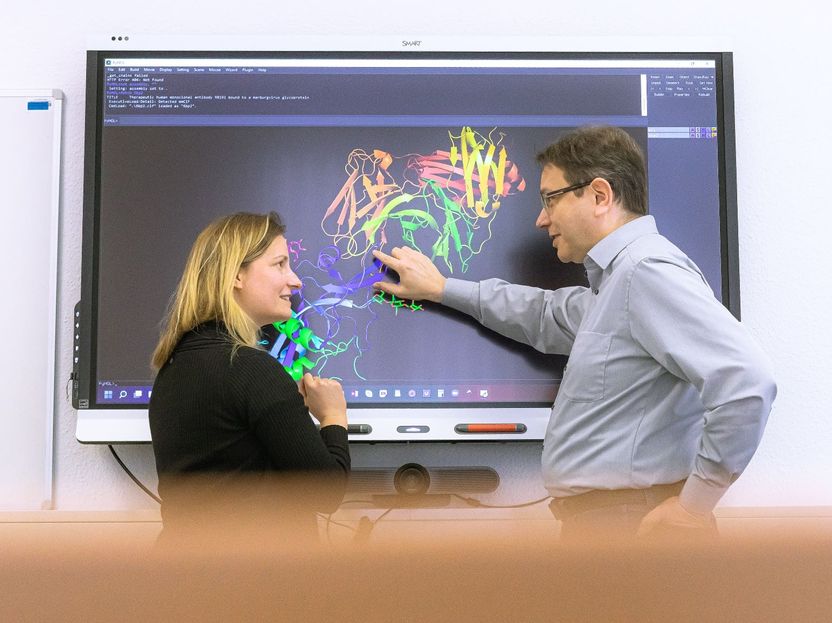Building a ‘vaccine library’ to prevent future pandemics
Using classical and AI-based software, vaccine candidates will be designed for ten priority virus families with epidemic and pandemic potential
The Institute for Drug Discovery led by Humboldt Professor Jens Meiler is to receive 1.9 million dollars (1.77 million euros) for the development of vaccines. The international Coalition for Epidemic Preparedness Innovations (CEPI) will fund computer-aided vaccine development at Leipzig University with the aim of building a digital ‘vaccine library’ of components and virtual antigen designs. Using classical and AI-based software, vaccine candidates will be designed for ten priority virus families with epidemic and pandemic potential, with the aim of developing a potential vaccine in the shortest possible time in the event that a new viral threat emerges.

Humboldt-Prof. Dr. Jens Meiler and Dr. Clara T. Schoeder analyse protein structures.
Swen Reichhold
Social upheavals such as globalisation, urbanisation and climate change promote and increase the likelihood and frequency of viral outbreaks that could lead to new pandemics. With the outbreak and spread of the SARS-CoV-2 virus, the world experienced the existential and long-lasting impact that viral mutation can have. To be better prepared for a future pandemic, CEPI is investing in a research project to develop novel antigen designs at the Institute of Drug Discovery at the Faculty of Medicine. The team, led by director and Humboldt Professor Jens Meiler, is focusing on ten known virus families to build the ‘vaccine library’ and is using the computer-based Rosetta platform for its research. “Rosetta is a dynamic and evolving software system that deals with the prediction and design of biomolecular structures. We are using Rosetta to design compounds that don’t exist in nature. It’s very creative,” explains Professor Meiler, continuing: “We’re building a vaccine library that clinical developers will then be able to draw from.”
For the sponsor CEPI, an egalitarian approach is a prerequisite for this project: partners and developers provide their knowledge in one ‘vaccine library’ and can take knowledge from another. “In this research project, we are basically learning what we can improve in vaccine design in order to develop vaccines better and, above all, faster in the future. To do this, we use computer-aided design, including machine learning, to optimise protein design. This means that we train with the programme and learn what we can already design well and where we need to adapt our programmes further,” explains project leader Dr Clara T. Schoeder, who will take up a junior professorship in the development of immunotherapeutics at Leipzig’s Faculty of Medicine on 1 July 2023.
The research project is scheduled to run for five years. A working group from Houston Methodist Hospital in Texas is also a partner in the project and is in contact with Dr Schoeder’s research group. Preliminary results are expected in late 2023 or early 2024.
Most read news
Topics
Organizations
Other news from the department science
These products might interest you

Limsophy by AAC Infotray
Optimise your laboratory processes with Limsophy LIMS
Seamless integration and process optimisation in laboratory data management

ERP-Software GUS-OS Suite by GUS
Holistic ERP solution for companies in the process industry
Integrate all departments for seamless collaboration

Get the life science industry in your inbox
By submitting this form you agree that LUMITOS AG will send you the newsletter(s) selected above by email. Your data will not be passed on to third parties. Your data will be stored and processed in accordance with our data protection regulations. LUMITOS may contact you by email for the purpose of advertising or market and opinion surveys. You can revoke your consent at any time without giving reasons to LUMITOS AG, Ernst-Augustin-Str. 2, 12489 Berlin, Germany or by e-mail at revoke@lumitos.com with effect for the future. In addition, each email contains a link to unsubscribe from the corresponding newsletter.






















































